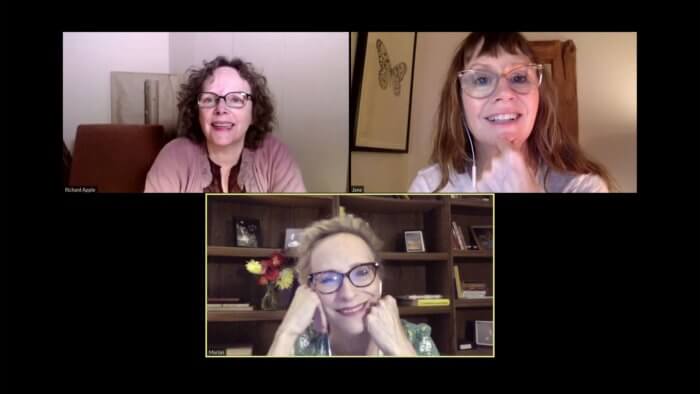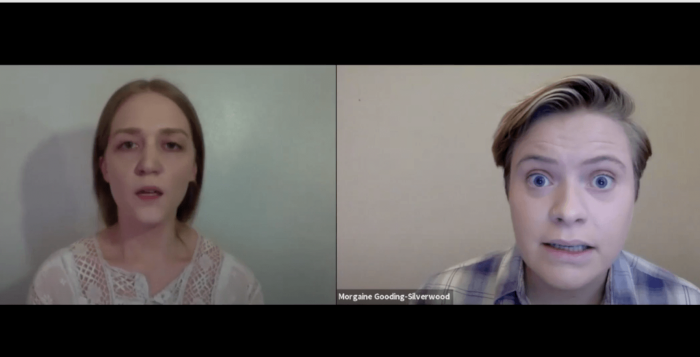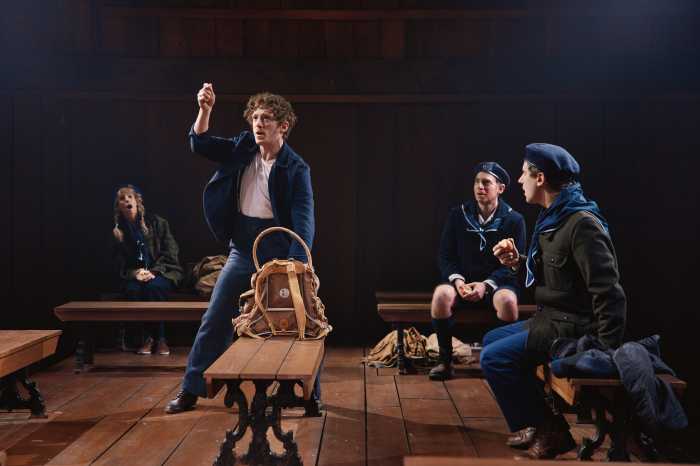One of the great compensations in this pandemic world has been the ability to virtually connect with friends and families by video technology platforms like Zoom. Certainly, video chats pale in comparison to in-person visits, but it is remarkable how they have transformed communication in just a few short months. Despite isolation and separation, we have still been able to participate in the dailiness of our friends’ and families’ lives. Such meetings would have been inconceivable in previous global events that forced us into prolonged, distanced lives, such as pandemics or wars when the rare, expensive long-distance phone call or letters were all people had to sustain fragile, mutable human links.
In his masterful trilogy of plays created for Zoom, playwright and director Richard Nelson has given us glimpses into the lives of the Apple family as they struggle and survive in the world of COVID-19. The first was in April, the second in July, and now the third “Incidental Moments of the Day,” is set right now — the early weeks of September. For those familiar with the characters from the series of plays at the Public and the first two Zoom plays, there is an ease of intimacy with these characters as we slip into this piece, and it’s almost surprising to discover how eager we’ve been to know what’s going on with them and how they are coping.
Rhinebeck’s Apple family begins to rejoin the world in Richard Nelson’s latest Zoom play
It’s a mixed bag as the adult siblings gather, though they are all resolutely doing the best they can as they tentatively try to rejoin the world. Richard, now retired, and Barbara are in Albany, clearing out his apartment where he lived while he was a lawyer for Governor Andrew Cuomo, and preparing for him to return to Rhinebeck where most of the family lives. Jane, the youngest, is still staying closer to her home and struggling with depression while her boyfriend, Tim, is in Amherst, staying in his childhood bedroom, joined there by his daughter from his first marriage and her friend. Marian is available only briefly, because she has a date — her first since the pandemic started.
The family is joined briefly by Lucy Michaels, a former student of Barbara’s who is on a dance fellowship in France and performs a dance for them via the Zoom connection. Lucy had appeared in Nelson’s play “The Michaels” about another family in Rhinebeck and done a version of this dance in that one. We also hear Nelson’s other Rhinebeck family, the Gabriels, mentioned as well. This effortlessly adds texture and context to the world of these characters, for those familiar with Nelson’s other pieces.
As with all the other Nelson plays, nothing much happens, yet “Incidental Moments of the Day” is both profound and engrossing. The title, as Tim describes, comes from the subtitle of an exhibit of Pierre Bonnard’s paintings that his mother, now in a memory care facility, saw at the Tate Modern in London. That, Tim says, is what the artist painted. That, too, is what Nelson portrays — the little things of quotidian existence. The actors face their computer cameras throughout, and the intimacy of the form allows a kind of subtlety in the performance that is sometimes breathtaking in how much it conveys. The family dynamics are so compelling partially because of the palpable need to connect and the frustration at the medium’s limitations underscored by the conversations. There are momentary misunderstandings, a need for clarity and reassurance, and always the sense that uncertainty is just on the other side of the door. Though never overtly expressed, the disequilibrium each character is experiencing provides sustained tension throughout. Nelson beautifully captured these moments in the theater, too, but being up close with each character, each nuanced moment registers.

The Apples tackle large issues, as well. In this play, they are beginning to move beyond their homes and their quarantines and encountering more of the world. The characters share stories about new sensitivities to issues of race, difficulty in communicating, the divisions in the culture, how easy it is for people to misunderstand one another, and how quickly people impute bad intentions on others.
At one point, Barbara sadly notes that new awareness doesn’t seem to have broadened horizons, saying, “Instead it feels to me like we’re making it all smaller and smaller. Cutting up this, dividing it into that. This is yours — this is mine. These are the lines. These are the borders. The walls. Don’t cross them. Or cross them at your own risk… Doesn’t that just reduce who we are? And so we become smaller and smaller…”
Juxtaposing this moment against one in which Barbara tells a lame joke particularly badly, we see the richness of the family, the relationships and the love that binds them, despite everything.
The ensemble remains unchanged from all the previous plays. Jay O. Sanders is Richard; Maryann Plunkett is Barbara; Sally Murphy is Jane; Stephen Kunken is Tim; and Laila Robins (fleetingly) is Marian. They are joined by Charlotte Bydwell as Lucy. They are all so at home in these roles now that they seem effortless, though they are anything but. The detail in each performance — and Plunkett and Murphy’s in particular in this piece — is awe-inspiring.
Like many of the most memorable characters in literature, it’s hard to bid farewell to these characters. Though we may not see them again, the Apples will continue to live in our hearts and minds. As we continue to make our way through this pandemic world and into whatever lies ahead, it wouldn’t be surprising, every once in a while, to wonder how they are dealing with the world that will emerge from this time.
INCIDENTAL MOMENTS OF THE DAY: The Apple Family Life on Zoom | Through Nov. 5 | Free at theapplefamilyplays.com through Nov. 5 | Audience members are encouraged to donate to the Stage Directors and Choreographers at https:// sdcfoundation.org/get-involved/donate/.
To sign up for the Gay City News email newsletter, visit gaycitynews.com/newsletter.



































